‘We can’t solve this problem alone’
Brandon asks for provincial help to address financial crisis
Advertisement
Read this article for free:
or
Already have an account? Log in here »
We need your support!
Local journalism needs your support!
As we navigate through unprecedented times, our journalists are working harder than ever to bring you the latest local updates to keep you safe and informed.
Now, more than ever, we need your support.
Starting at $15.99 plus taxes every four weeks you can access your Brandon Sun online and full access to all content as it appears on our website.
Subscribe Nowor call circulation directly at (204) 727-0527.
Your pledge helps to ensure we provide the news that matters most to your community!
To continue reading, please subscribe:
Add Brandon Sun access to your Free Press subscription for only an additional
$1 for the first 4 weeks*
*Your next subscription payment will increase by $1.00 and you will be charged $20.00 plus GST for four weeks. After four weeks, your payment will increase to $24.00 plus GST every four weeks.
Read unlimited articles for free today:
or
Already have an account? Log in here »
Hey there, time traveller!
This article was published 16/12/2023 (677 days ago), so information in it may no longer be current.
Brandon’s city manager called on the provincial and federal governments to pay their fair share in the effort to dig the Wheat City out of a financial hole.
The city publicly released a 10-year sustainability report created by accounting firm MNP on Friday that suggests steep property tax increases as well as boosts to other fees charged by the city in order to maintain its current services, operations and infrastructure are required.
“We also know that we can’t solve this problem alone, our aging infrastructure or infrastructure deficit has been happening for years,” city manager Ron Bowles said during a Friday morning press conference at Brandon City Hall.
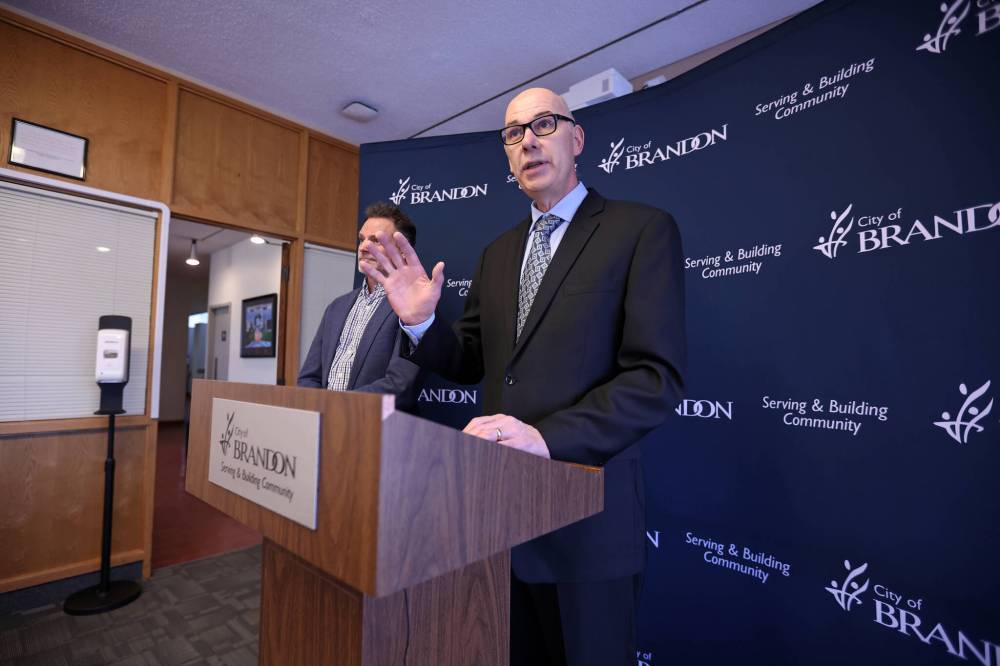
Brandon city manager Ron Bowles speaks at city hall on Friday during a press conference regarding the 2024 budget and the release of a contracted sustainability report by MNP. (Tim Smith/The Brandon Sun)
“We are looking to the federal government, the provincial government to pay their fair share. For seven years now, the Province of Manitoba has had a municipal funding freeze, and that has hurt.”
That freeze was ended by the previous provincial government early this year, and new Premier Wab Kinew has pledged to keep the thaw in place.
From 2014 to 2023, Brandon raised taxes an average of 0.80 per cent a year.
MNP offers two financial scenarios for the city. One would see taxes go up by nine per cent a year between 2024 and 2033.
The other would see taxes be raised by around 13 per cent a year for the next four years and then by around three per cent a year for the six years after that, averaging out to around 7.1 per cent a year over 10 years.
The report states that in 2023, the average single-family household with a home valued at $278,900 was expected to pay $2,783 in combined property taxes and water and sewer rates. By 2027, with utility rates set to rise and assuming 13 per cent tax increases every year, that number would jump to $4,499 for the same household.
Bowles portrayed the report in a positive light and said much of it was a worst-case scenario despite its assessment that low tax rates in recent years have not reflected inflation rates and that debt will be required to finance almost one-third of the city’s capital projects over the next decade.
“It recognizes that we were living up to our core values of low taxes and providing great services,” Bowles said. “In fact, MNP did a comparison between communities across Canada about our size and they found that Brandon’s taxes are 47 per cent below the average of those municipalities.”
He also said the report found that the city was running its operations efficiently, though the summary stated that low per-capita operating expenditures could also “indicate a reduced level of service compared to other municipalities.”
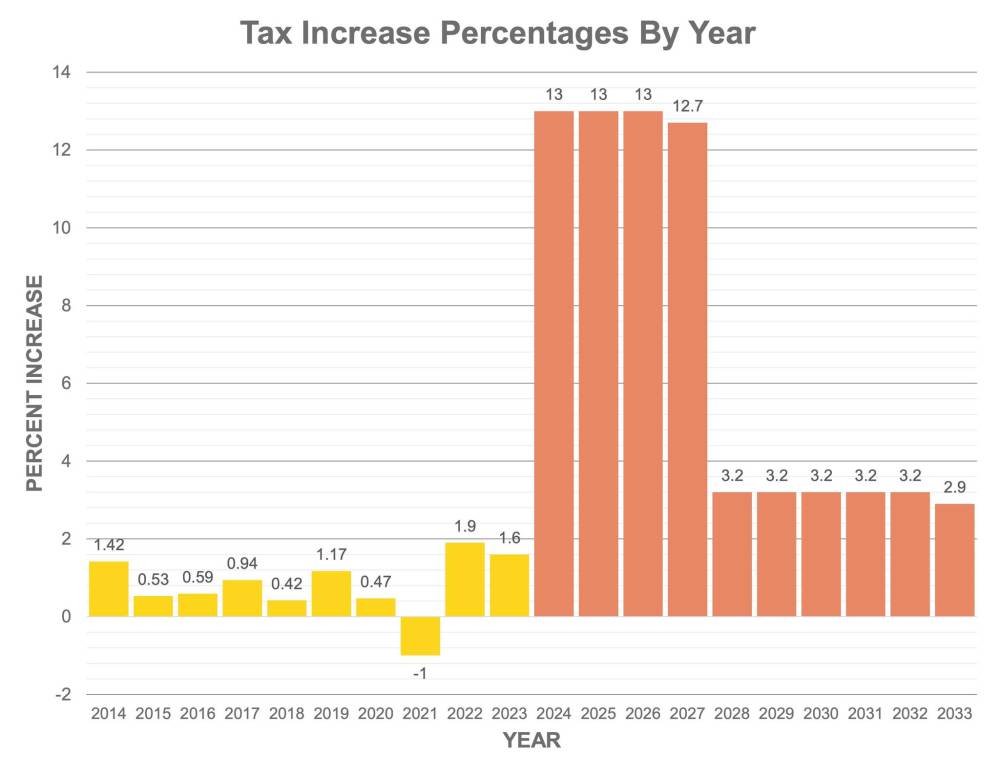
However, he acknowledged some of the challenges now facing the city.
“After many years of the city choosing to keep taxes low, we’re in a tight spot,” he said. “But actually, it is clear that we need to take some action now to adjust our course in order to implement reasonable and sensible tax increases for 2024 and beyond.”
Brandon, Bowles said, got into this situation over decades and it will take more than a single year to get out of it. He added that many municipalities in Canada are facing a similar problem of infrastructure built in the ’50s and ’60s reaching the end of their life.
Discussing potential negotiations with the province, Bowles said the government would not hold Brandon to task for keeping taxes low and keeping operations lean.
“I don’t see the provincial government saying ‘well, you haven’t been taxing so we’re not going to fund,’” he said. “Because we want to grow the community, they want us to prosper as we want to prosper.”
For MNP’s plan to work, Brandon will need to implement those tax increases and find other sources of revenues from increasing development cost charges, continuing to raise utility rates, instituting drainage fees on residential and commercial properties and instituting new business ventures at the landfill.
Bowles would not say what the result would be if the city failed to adhere to MNP’s plan, in part because Brandon City Council has yet to weigh in on the situation. The city manager was also evasive about whether Brandon knew how serious the financial situation was before the report was delivered.
Mayor Jeff Fawcett and city councillors were not present at the press conference, though the mayor did speak to reporters afterwards.
According to Bowles, the report will be officially presented to council at its Monday meeting, though he conceded that they have already been briefed about its contents.
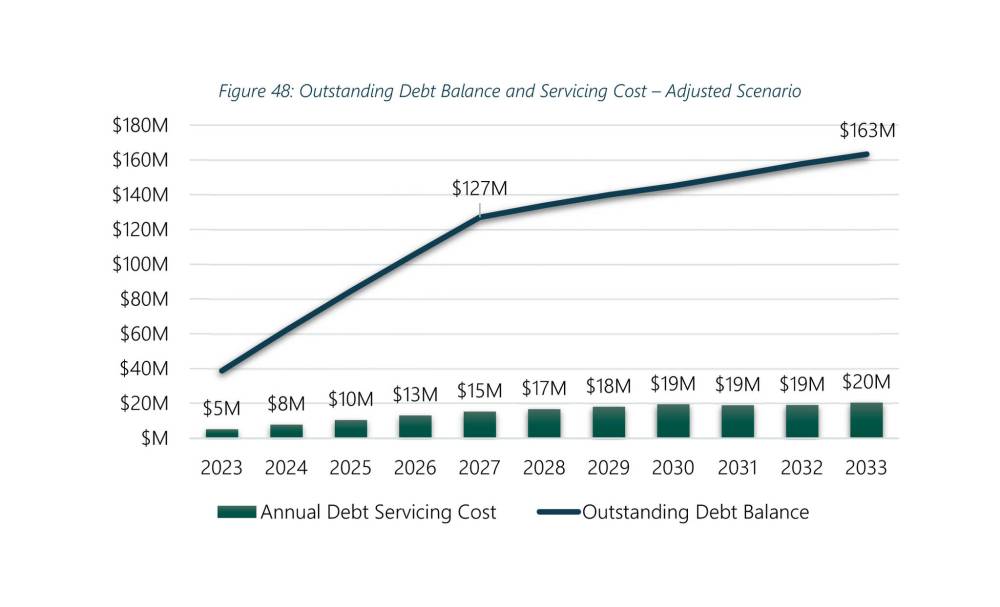
The report states that in interviews performed by MNP with members of council, some elected officials expressed frustration about a lack of information provided by city administration. Bowles said providing them with this report would give councillors the kind of information they need.
Fawcett confirmed to reporters that Brandon “will probably be looking at some higher numbers” in terms of property tax increases. He said there were cases in previous years where administration had come into budget deliberations proposing a nine per cent property tax increase that council managed to whittle down to the region of 2.6 per cent.
“The report isn’t gospel,” Fawcett said. “We’ll dissect the report just the same as residents would and we’ll dig deeper into it and see what is manageable for people.”
Asked if council had kept taxes too low, Fawcett said maybe they were but in that case what would the city have spent the extra revenue on.
“We’ve probably gone into reserves more than other places,” he said. “But the questions you’re asking here, unfortunately, can be asked across the country because if you notice, every municipality is getting hit hard on taxes.”
The mayor said council wanted to have a better idea of what the financial picture is going forward and wanted to be able to have a four-year budget in mind, though he doesn’t particularly like the next four years as proposed in the report.
Reached by phone, Coun. Kris Desjarlais (Ward 2) said the extent of Brandon’s financial situation was a bit of a surprise.
“I’ve always thought that we’re going to have to face the music here sooner or later with a lot of these infrastructure developments and not enough money in our reserves and we were going to have to look at debenture because we didn’t have any money for these things,” Desjarlais said. “We should have been saving for them over the years.”
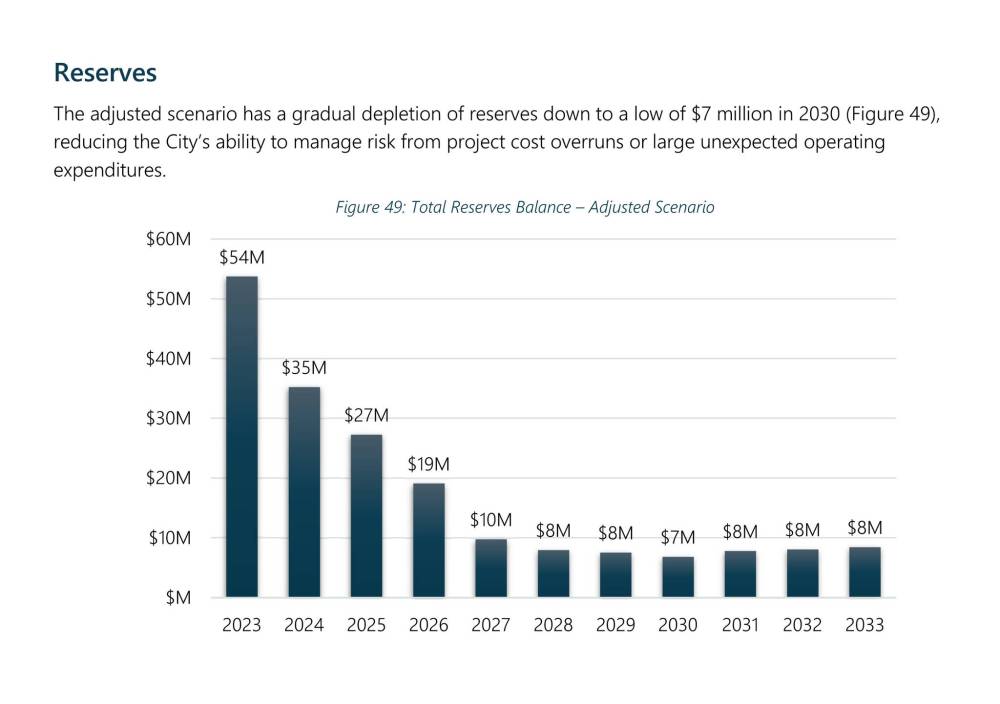
Desjarlais said the city depleting its financial reserves over time in order to keep tax increases low is now proving a challenge, though he said he doesn’t think the funds taken out of reserves would have paid for the entirety of the new capital projects on Brandon’s shopping list.
The $30 million Brandon borrowed for drainage improvements in the southeast was necessary, but Desjarlais said that it hadn’t been accounted for in the city’s financial forecast.
Then there’s the further $30 million that will be borrowed to pay for two new lift stations in southwest Brandon to facilitate development in that area.
“I think some councillors were under the assumption that if you borrow this money to pay for growth, the development charges and all the taxation that you’re going to receive from all those additional properties will easily offset any overwhelming tax increases,” Desjarlais said. “I think they’re realizing that’s not the case.”
The downtown ward councillor said that he and his colleagues have some difficult discussions ahead of them and it’s important for them to connect with residents as much as possible between now and budget deliberations.
Coun. Glen Parker (Ward 9), a member of the city’s audit and finance committee, said the situation is a problem that will take a bit of work to address.
“Sure, we could have increased the taxes more, but if people are thinking ‘Jesus, if we put more money into reserves, we could have paid for the lift stations,’ that’s ludicrous,” Parker said.
“We would have never saved $30 million over the last seven or eight years. We would have had to raise taxes 30 per cent a year to fund the reserves enough to come anywhere close to paying for it.”
He said he wasn’t sure if he views the situation as a problem yet and that what was being presented was an absolute worst-case scenario.
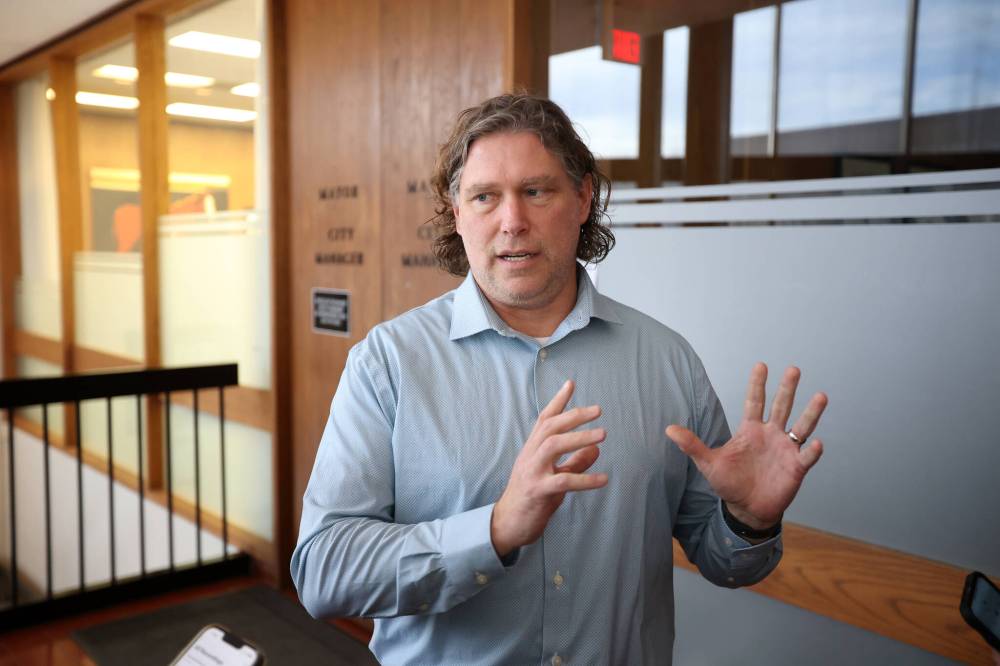
Brandon Mayor Jeff Fawcett speaks to members of the media outside his office following a press conference discussing a report that states the city is in a dire fiscal position. (Tim Smith/The Brandon Sun)
“We’re not going to be having one per cent increases over the next several years by any stretch, but it’s not doom and gloom.”
In an email, Municipal Relations Minister Ian Bushie said he will be speaking with the mayor about the situation.
“For years, municipal funding freezes from the former government harmed municipalities, including Brandon,” Bushie wrote. “Our government has committed to providing stable and predictable funding for municipalities. I look forward to speaking with the mayor on this issue and other municipal priorities.”
» cslark@brandonsun.com
» X: @ColinSlark
